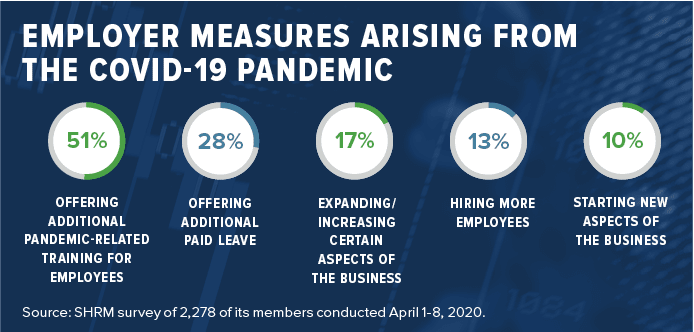This article originally appeared on SHRM: https://www.shrm.org/hr-today/news/hr-magazine/summer2020/pages/employers-see-opportunities-borne-of-the-coronavirus.aspx
An Employer’s Perspective on COVID-19 Vaccinations
By Alexander Alonso
May 22, 2020
Nobel Prize-winning author John Steinbeck depicted the plight of working-class Americans as they fought through the Great Depression, and he portrayed the crushing effect of poverty on the national spirit.
“A sad soul can kill you quicker, far quicker, than a germ,” he wrote. With COVID-19, we’re seeing how quickly a germ can kill, as well.
Almost everyone has likely experienced sadness, but not since the Great Depression and World War II have we encountered a global crisis of this magnitude. Now the whole world is fighting through a pandemic with crushing effects that threaten depression once again, both personal and economic.
The implications are distressing:
- Americans’ optimism about the nation’s future will drop by nearly 8 percent for every month of the outbreak, Gallup estimates.
- By mid-May, more than 36 million people in the U.S. had filed for unemployment benefits since the coronavirus crisis began.
- Nearly 5 percent of small and midsize enterprises will shut down during every week spent in some form of quarantine, according to projections from the Society for Human Resource Management (SHRM).
Depressing, isn’t it? In the blink of an eye, we saw much of our global economy grind to a halt.
But all hope is not lost. Throughout much of the economy, invention is leading to gains for the greater good. Several enterprises are grasping today’s new realities and evolving. Yes, jobs are being lost now, but there is cause for optimism for the future. A SHRM poll regarding the COVID-19 pandemic reveals the variety of measures employers are taking due to the crisis.
Certainly, some measures are to be expected. SHRM and other groups are leading the way to enhance paid-leave policy and provide valuable educational information. The HR profession is also serving as a positive social force by helping those affected by unemployment.
Other measures are less expected. SHRM found that more than 17 percent of employers are “expanding or increasing certain aspects of the business.” CVS Health, for instance, plans to expand its community support programs, adding 50,000 employees from the ranks of laid-off workers.
What’s even more surprising is that 10 percent of employers are launching entirely new business lines. For example, some clothing manufacturers are creating personal protective equipment garments, and alcoholic beverage giant Bacardi is producing antibacterial products. These companies are among the more than 13 percent of employers that plan to hire more employees to meet new demands while driving new revenue streams.
Many of us have stopped watching the news for fear of sadness setting in. I’m certainly not an optimist, but even I am reminded by some of the data coming in that this too shall pass. Enterprises are responding with innovation and doing their part to combat the pandemic. Regardless of whether they’re motivated by altruism or capitalism, they will help stave off depression.
